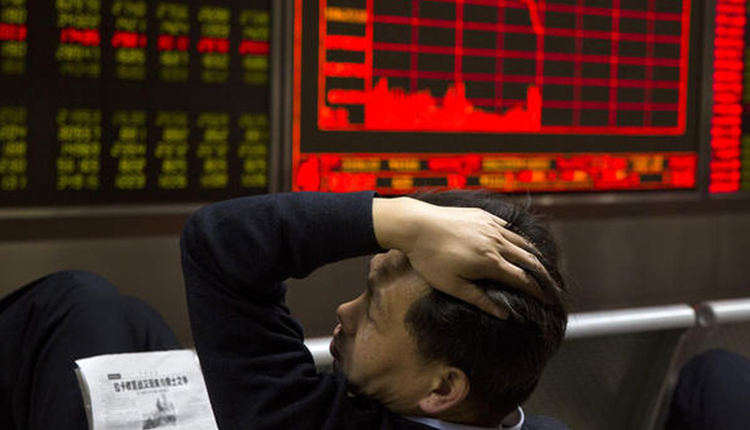Asian markets pared earlier earnings as they declined in Wednesday afternoon trade despite the S&P 500 and Nasdaq Composite closing at record-high territory overnight on Wall Street.
The Nikkei 225 in Japan slipped 0.38% in afternoon trade, despite shares of index heavyweight Fast Retailing rising. The Topix index was 0.7% lower.
Nissan Motor saw its shares drop more than 3.5% after Reuters cited Japanese media as saying the company was set to slash its earnings outlook for the fiscal year that ended in March.
Mainland Chinese shares also slipped by the afternoon, with the Shanghai composite declining 0.92% and the Shenzhen component shedding about 0.53%. The Shenzhen composite also fell 0.473%, while Hong Kong’s Hang Seng index fell 0.85%.
Bucking the trend, Australia’s ASX 200 added 0.9%, trading at more than 10-year highs as the sectors mostly advanced.
The Australian dollar tumbled to $0.7035 following an earlier high of $0.7102 following the release of inflation data Down Under that came in at a record low, raising the prospects of a rate cut by the Reserve Bank of Australia (RBA).
Earlier in April, the Australian central bank said interest rates would need to be slashed if “inflation did not move any higher and unemployment trended up. ”
“Australian inflation shows no signs of coming anywhere near the central point of the RBA’s 2-3% range, and we are biting the bullet and changing our ‘on-hold’ call for the RBA to a cut, possibly as early as the 7 May meeting,” Robert Carnell, chief economist and head of Asia Pacific research at ING, wrote in a morning note.
In South Korea, the Kospi dropped 1.22%, with chipmaker SK Hynix falling almost 4%. LG Display plunged more than 5% after the company reported larger-than-expected operating loss for the first quarter ending in March.
Overnight on Wall Street, the S&P 500 added 0.9 percent to close at 2,933.68 — besting its previous record close of 2,930.75. The Nasdaq ended its trading day stateside up 1.3 percent at 8,120.82. The Dow Jones Industrial Average, meanwhile, added 145.34 points to close at 26,656.39 and was 1.1 percent from an all-time high.
Tuesday’s move toward an all-time closing high comes less than six months after a sharp decline in late December, which led the S&P 500 to its worst annual performance since 2008. But stocks quickly turned around as the Federal Reserve reversed course on monetary policy while the tone around U.S.-China trade talks improved.
This is one of the busiest weeks of the corporate earnings season. Once the dust settles, more than 140 S&P 500 companies will have released their calendar first-quarter results.
So far, the results have largely topped expectations. More than 78% of the S&P 500 companies that have reported have surpassed analyst expectations, according to FactSet data.
On the U.S.-China trade front, Washington is set to send a trade delegation to Beijing next week as trade negotiations between the two economic powerhouses continue.
The United States Trade Representative Robert Lighthizer and Secretary of the Treasury Steven Mnuchin will head to Beijing for talks that will begin on April 30, the U.S. Press Secretary Sarah Huckabee Sanders said in a statement. They will meet with Chinese Vice Premier Liu He.
Following those talks, the Chinese vice premier will lead a delegation to Washington for further discussions that begin on May 8.
Meanwhile, oil prices touched nearly six month highs on Tuesday as they continued their ascent after U.S. President Donald Trump’s administration announced on Monday that it will not extend sanctions waivers to countries that import Iranian oil.
“China and India are the biggest buyers of Iranian crude. I mean, together they account for over 50% of total Iranian crude exports and they will be the most impacted by this,” Neil Beveridge, senior oil and gas analyst at Bernstein, told CNBC’s “Squawk Box” on Wednesday.
“I think what China will be looking at is for other members of OPEC to make up the shortfall with the reduction in Iranian exports and i think that’s going to principally come from Saudi Arabia,” Beveridge said, referring to the Organization of the Petroleum Exporting Countries.
Crude prices retraced some of their earlier gains in Asian afternoon trade on Wednesday, with the international benchmark Brent crude futures contract slipping 0.55% to $74.10 per barrel. U.S. crude futures also fell 0.56% to $65.93 per barrel.
The U.S. dollar index, which tracks the greenback against a basket of its peers, was at 97.664 after rising sharply from levels below 97.5 in the previous session. The Japanese yen traded at 111.83 against the dollar after seeing an earlier high of 111.75.
Source: CNBC


